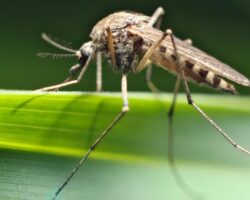After West Nile virus-positive mosquitoes were found in several Lake County towns, the health department issued a warning.

Wellbeing authorities are cautioning people in general and offering tips after bunches of mosquitoes in numerous Lake District towns tried positive for West Nile infection interestingly this year.
On June 27, samples were taken from a “pool” of mosquitoes, also known as a batch of mosquitoes, in Bannockburn, Lake Villa, and Vernon Hills.
West Nile virus was found in all three batches tested.
The positive pools, according to the Lake County Health Department, are the first confirmed signs of West Nile virus presence in Lake County in 2023.
Mark Pfister, Executive Director of the Lake County Health Department and Community Health Center, stated, “We expect mosquitoes every summer, but it is important to remember that they can also carry diseases like West Nile Virus.”
“By figuring out how to ‘Battle the Nibble’, we can shield ourselves and our families from a possibly dangerous sickness,” Pfister said.
[Suggested Article] A man has been charged with urinating on a corrections officer at Lake County Jail in Waukegan. The health department advises the public to follow the “4 Ds of Defense” to keep mosquitoes out of their homes and families:
Drain: Remove anything that has accumulated water from your home, yard, and workplace.
Defend: Apply an insect repellent that contains DEET, picaridin, oil of lemon eucalyptus, 2-undecanone, or IR3535 every time you go outside, following the directions on the label.
Sunrise and Nightfall: Safeguard yourself the entire constantly, and wear repellent outside during these ideal times for mosquito movement.
Dress: When you are outside, cover your skin by wearing pants, closed-toe shoes, and long sleeves.
The primary West Nile virus carriers, Culex pipiens mosquitoes, are most prevalent during hot weather.
By removing areas of stagnant water from their properties, residents can assist in preventing the breeding of these mosquitoes.
Any water-holding objects around homes and businesses, including buckets, gutters, plant containers, and kiddie pools, can become breeding grounds.
[Suggested Article] A fire investigation is underway following the destruction of the former Vista West hospital in Waukegan. The Mosquito Surveillance Program of the Lake County Health Department coordinates the outcomes of mosquito trappings throughout Lake County.
Every week, the West Nile virus is tested on mosquitoes. Additionally, the program looks for the presence of Culex mosquito larvae in areas of stagnant water and monitors reports of dead birds, which can be an early indication of the virus’s presence.
According to Alana Bartolai, Ecological Services Program Coordinator at the Lake County Health Department, “the Culex mosquitoes that cause West Nile virus are still present” despite the fact that overall, there are fewer mosquitoes due to the hot, dry weather.
According to Bartolai, “the years with the most cases of West Nile virus have frequently been during hot, dry summers.”
In 2022, West Nile virus was found in 81 mosquito pools.
Starting around 2002, there have been 79 affirmed human instances of West Nile infection in Lake Area as well as four affirmed passings.
[Recommended Article] Excellent jury arraigns Grayslake man blamed for unintentionally shooting, genuinely harming baby in Vernon Slopes
The vast majority contaminated with West Nile infection have no side effects of disease. Nonetheless, some might turn out to be sick generally 3-15 days after the chomp of a contaminated mosquito, the wellbeing division said.
Fever, nausea, headache, and muscle ache are all common signs. In certain people, extreme sickness including meningitis or encephalitis, or even passing, can happen.
West Nile virus is more likely to cause severe illness in people over 50 and those with weaker immune systems.
Additionally, residents can obtain additional information regarding the signs and symptoms of West Nile virus by calling the health department’s West Nile hotline to report areas of stagnant water, locations of dead birds, and so on.


